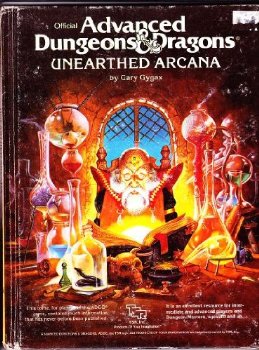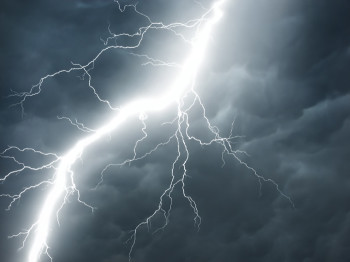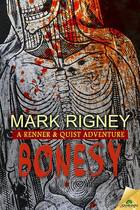The Worst AD&D Spell Of All Time
 So there we stood, surrounded. Demons in all directions, converging fast – and we’re not talking garden variety patsies. Even for our major league party, the future looked bleak, bloody, and painful. On the plus side, we had our pizza in place, our dice at the ready. Beers and sodas hovered with popped caps and bated breath, anticipating action.
So there we stood, surrounded. Demons in all directions, converging fast – and we’re not talking garden variety patsies. Even for our major league party, the future looked bleak, bloody, and painful. On the plus side, we had our pizza in place, our dice at the ready. Beers and sodas hovered with popped caps and bated breath, anticipating action.
“Initiative!” cried the DM.
We each rolled. One of the demons, which just happened to moonlight as a spell-caster, moved first — and what did that pipsqueak no-good blackguard cheat of a demon cast our way?
Chain Lightning.
At fifteenth level.
Two hours later, with the pizza cold and stiff, the beers stale and the sodas flat, we finally finished adjudicating the effects of that single spell. We were in shock, and grumbling to beat the band. The DM, equally weary and perplexed, said, “Okay. Still first round. Who gets to take the next action?”
That I no longer recall, but this I know: we won the battle, and the demons lost. So did Chain Lightning. We made a solemn pledge that very day to never again allow that spell to eclipse the glory of our triumphant campaigning. Banned it was, all but ripped from the pages of the rulebook. And good riddance, too.
 Chain Lightning first appeared in Unearthed Arcana back in 1985. Gary Gygax (who else) received author’s credit. As for Chain Lightning itself, it’s a sixth-level magic-user spell, and the full write-up may be found on page fifty-nine. Top right, you can’t miss it, especially since the spell description takes up easily four-fifths of the page.
Chain Lightning first appeared in Unearthed Arcana back in 1985. Gary Gygax (who else) received author’s credit. As for Chain Lightning itself, it’s a sixth-level magic-user spell, and the full write-up may be found on page fifty-nine. Top right, you can’t miss it, especially since the spell description takes up easily four-fifths of the page.
Why is it so hard to use, in-game? Let’s allow the text to speak for itself:
In addition, after striking its primary target, the bolt arcs to the nearest other object, be it animal, vegetable, or mineral. This chain of striking continues from one object to another… the chain keeps building up as many “links” (including the initial target) as the spell caster has levels.
In effect, this single spell re-cast itself (in our particular combat) fifteen times.
Then — worse by far! — the bolt had to be re-directed. Fairly. But randomly.
If memory serves, we were a party of seven that day, and we’d arrived (via teleportation) in a tightly packed knot. Once that lightning bolt hit us, it proceeded to ricochet through our party like — well, like a lightning bolt ricocheting through a tightly packed knot of flabbergasted adventurers.
Each time the bolt touched down, a saving throw had to be figured out and rolled. Damage then had to be assessed, but not only to the character struck. Magical (and some non-magical) items worn or carried by each affected character also had to be considered — primarily if the character missed their save, true, but those failed saves happened, believe me, and more than once.
 Perhaps this doesn’t sound like much, but in reality (in game reality) this took far too long to sort out. Two hours, in fact, as I’ve already mentioned, and let’s face it, two hours for a single combat action is one point nine hours too long for any spell or attack.
Perhaps this doesn’t sound like much, but in reality (in game reality) this took far too long to sort out. Two hours, in fact, as I’ve already mentioned, and let’s face it, two hours for a single combat action is one point nine hours too long for any spell or attack.
Thus the ban, all but carved in stone like a latent eleventh commandment, “Thou shalt not cast Chain Lightning. If you do, you shall be expelled from the cosmos and turned into a pink nixie.”
Perhaps you, gentle reader, had a similar experience with this pernicious, if well intentioned, disaster of a spell?
Or possibly you have your own particular spell bias, a necromantic, clerical, or other magick that simply makes you rip out your nose hair for ever having allowed it to darken a single moment of your gaming life?
If so, please do share. I do love a good horror story.
Onward.
Mark Rigney has published three stories in the Black Gate Online Fiction library: ”The Trade,” “The Find,” and “The Keystone.” Tangent called the tales “Reminiscent of the old sword & sorcery classics… once I started reading, I couldn’t stop. I highly recommend the complete trilogy.” Also available at Black Gate is his serialized novel, In the Wake Of Sister Blue. The first installment may be found HERE.
Away from Black Gate, he is the author of the supernatural quartet, The Skates, Sleeping Bear, Check-Out Time, and Bonesy, all published by Samhain and featuring his semi-dynamic duo of Renner & Quist. His short fiction has been nominated for a Pushcart Prize and has appeared in Unlikely Story, Betwixt, Black Static, The Best of the Bellevue Literary Review, Realms of Fantasy, Witness, The Beloit Fiction Journal, Talebones, Not One Of Us, Andromeda Spaceways Inflight Magazine, Lady Churchill’s Rosebud Wristlet and many more. In other work, Rigney is the author of the plays Ten Red Kings, Acts of God and Bears, winner of the 2012 Panowski Playwriting Competition, as well as the non-fiction book Deaf Side Story: Deaf Sharks, Hearing Jets and a Classic American Musical (Gallaudet). Two collections of his stories (all previously published by various mags and ‘zines) are available through Amazon, Flights of Fantasy, and Reality Checks. His author’s page at Goodreads can be found HERE, and his website is markrigney.net.
 |
 |
 |
 |
I won’t go into any of them, but there are ways that situation could’ve been streamlined. Of course, streamlining for speed of the game is a relatively modern notion (maybe not at your table or mine, but in the broader gaming culture).
I don’t remember a particular spell which gave me headaches over the years, but there were a handful of 1st edition rules which I simply ignored as a DM. The weapons-vs-armor charts, for example, and encumbrances (though I kept a general watch on the characters so they wouldn’t overdo it).
Hilarious.
If I was DMing, this would be one of those times where I re-interpret and re-define the rules of a spell myself–superceding whatever is in the book. In this case I would have rolled damage for the 15d6 lightning bolt ONCE–and that amount of damage would be taken by ALL SEVEN party members as the bolt bounced rom one to another. Anyone who saves takes half damage.
I wouldn’t have even bothered with the items saving throws–unless there was something particularly vulnerable to electricity.
One damage roll, seven saves, and you’re done. That’s how I would have done it to avoid the wasted two hours.
One of the great things about DMing is that you can change pretty much anything in the name of making the game better, smoother, and more fun.
Now here’s what gave me a headache: Two wizards,both with a Temporal Fugue spell. This creates a 10-foot radius sphere where time flows faster–so characters can stay inside the zone and heal like 8 hours while only one hour goes by–that kind of thing. No problem–but when the second wizard entered the Temporal Fugue zone and cast a SECOND Temporal Fugue spell, I had to do some quick thinking–I put a limit on the Fugue within a Fugue thing–saying it could only be done once inside the original Fugue–otherwise my characters could keeping Fugue-ing it up into eternity. However, my players soon figured out that within one of these Double Fugues, the were getting 10 melee rounds–10 attacks per round–at things outside the globe. Do you know what you can do with a Wand of Lightning from inside a Double Temporal Fugue? Yes, you can shoot 10 goddamn bolts of lightning in a single round and hit targets outside of the Fugue. Of course, a clever DM will always figure out how to restore the all-important Game Balance. It’s half the fun of being the DM!
Happy Gaming…
Give them 10 times as many targets? Per round.
I like to use chain lightning in Neverwinter Nights, since it’s a 1-player computer game so I can’t hit friendly party members and the computer calculates all the hits in about 3 or 4 seconds.
I’ve used it, and still use it, all the time, and love this spell. Never slowed down a game I was in, and always a room clearer.
No one whipped out a rules-lawyer card and said, “The ground is the closest object”? That would have saved you an hour.
We had a player who was very nearly physically thrown out of the room when he chain lightninged the party in a small room… for the second time!
Ty: Yes–10 rounds inside the Double Fugue equalled 1 round in the real world. That’s when my DM radar went off and I was like “Hmmmm…how can I stop the players from using this logic to throw game balance out of wack?” Which you can’t blame a wizard for trying to do–the whole reason they exist is to harness more and more powerful magical forces! I could have ruled that you can’t cast a Fugue inside a Fugue at all–but frankly I thought it showed great player cooperation in spell-use, so I allowed it. But as I said, I had to lay down a new “No Triple Fugues” rule. Pretty hilarious effect in a few battles–especially when they were completely overwhelmed by demons/vampires/liches and had to go into “blast mode”–it was some high-level, balls-out, kick-ass old-school gaming lemme tella.
I’m sorry that I threw the thread off the Chain Lighting Spell, but Mark did ask for other spells that could make a DM grimace…
(Tempus Fugit! THAT was the name of the spell…)
Love the commentary.
Lightning to ground. Yes, that its he quickest path. But not with magic involved. Or invoked!
The DM in that moment should indeed have found ways of streamlining what was going on. Didn’t happen. Do I lose or gain a halo if I swear it wasn’t me?
: )
Mark
I’ve found that some players should be banned from being spell casters. Like we had a fight in the middle of a sewer in chest deep water when our wizard wanted to cast a lightning bolt. The cries of anguish from the party and the laughter from the DM still scar my mind.
I think there should be a ban on rules lawyering wizards too. There is no greater weasel than a wizard with a rule book.
WildApe: LOL, I hear you–but to my mind wizard players using the spellbooks to convince the DM of magical effects, conditions, results, etc. is just part of the fun of being a wizard. Of course, the player has to be willing to accept the DM’s final ruling without griping, pouting, or throwing tantrums. If not, get rid of that player, but I like it when interesting things happen with magic spells/items that make the DM and player have to “get creative” to figure out exactly what’s happening and how. That said, it all has to be done in a timely manner because the non-spellcasters will get very bored while the DM and the wizard players discuss, argue, and decide. One thing I’ve noticed in the new 5th edition D&D–the rules are far more clear than the old-school editions, and probably less open to dispute and misunderstanding. They’ve really taking all the good stuff from the last 30 years and jettisoned most of the bad stuff. (Which is why I tried to do with 1st Edition when I revived it a few years ago for my gaming group–I basically rewrote the rules wherever I thought I could improve on them.)
I’m now considering a post topic for next week:
“AD&D’s Real Purpose: Learning To Rewrite the Rules!”
: )
Well, if you’re a DM, then re-writing the rules is part of the job. 🙂
My favorite spell-casting surprise came during a war that featured PCs on opposing sides (Good vs. Evil), with (for us) relatively high-level spellcasters leading (12th vs. 14th level). The decisive battle was a naval engagement. So, each commander thought, “Hmm, ships at sea? Shame if they hit a spot of weather.” So, the Good cleric cast Control Weather, while the Evil wizard summoned Storms.
“Hmm,” said the Referee, “I think that there’s about a 5% chance that there’s some synergy with these spells, so …” And yes, he rolled a 97 (we used the upper end of d100 for the “misfire” range) and so decided that we had triggered a super-cyclonic cell akin to the Great Red Spot on Jupiter. TPK for both teams!
When we resumed playing, it was 200 years later and the map was an altered, half-sunken version of the previous campaign world. Which did, at least, provide a very reasonable explanation for all the subterranean dungeons we could delve, most being former strongholds of PCs or our former patrons.
@Eugene—-your cleric must have been worshiping a weak god. Crom would have dusted the wizard. LOL–that is a good story.
@John R. Fultz—-Yeah, you are right. I just went with it because I always hated pouty DMs that took it out on the party. The whole point is to have fun but I think players get bored with the easy Monty Hall dungeons. By the way, I’ve got your latest book in my Kindle que. I’m looking forward to it.
Eugene: I second that–great story!!! I love it when campaigns go through cosmic changes. My last one we did the whole end-of-the-world-rebirht-of-a-new-one thing. It was cool.
Ape: Thanks, bro!
Mark,
I’m going to make a bold statement here and say that the DM and not the spell was the problem in your example. “Nearest object” and “determined randomly” are very different things and the first can be adjudicated rather quickly while the second takes time.
Having said that, I will also make a confession.
While I consider myself a very good DM in the present day and am the best DM I know ( 😉 ), I was a terrible DM when I started. When was that? Back when Unearthed Arcana came out.
I remember fondly running Keep on the Borderlands for my players where, because I hadn’t really read the purpose of the Keep, the players laid siege to the Keep and murdered its residents in preparation for the Caves of Chaos.
Now that was some terrible DMing.
[…] (Black Gate) The Worst AD&D Spell Of All Time — “Perhaps this doesn’t sound like much, but in reality (in game reality) this took […]
Christian – Yeah, probably a good idea to always read the module one is about to adjudicate. A perfect example of “The first step to solving a problem is knowing you have a problem,” right?
: )
Eugene & John & Ape: I once played a trickster thief who got confused when he came unstuck in time. He thought he was jamming his sword through the controls of a newfangled thing called an “elevator.” Turns out, it was the controls to the local nuclear reactor. Meltdown. I mourn him to this day.
[…] Don’t worry, it’s only a block or so away, just past Green Town, Illinois, and not so far from my last (highly opinionated) write-up on the ill-behaved sorcery known as Chain Lightning. […]